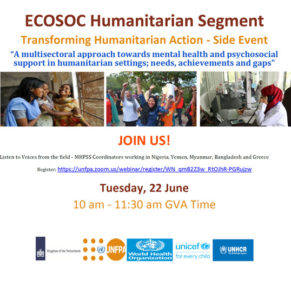This is one of the virtual side events to be convened on the margins of the ECOSOC Humanitarian Affairs Segment (HAS), which builds on this year’s HAS theme “Strengthening humanitarian assistance to face the challenges of 2021 and beyond: mobilizing respect for international humanitarian law, inclusion, gender, innovation and partnerships”.
Sarah Harrison, Technical Advisor for the IFRC Psychosocial Centre will be a presenter at this event.
Carmen Valle-Trabedelo, Co-Chair IASC Reference Group on MHPSS in Emergency Settings and Member of the IFRC Reference Centre for Psychosocial Support will be moderating this event.
Background and objectives of event
Mental health and psychosocial support (MHPSS) is a cross-cutting area in humanitarian work, with services and activities in multiple sectors such as health, protection, nutrition, education and others. The Inter-Agency Standing Committee released Guidelines on MHPSS in Emergency Settings in 2007 to assist organizations with a set of minimum responses to protect, support and improve mental health and psychosocial wellbeing of people in emergencies.
In the last decade, country-level MHPSS working groups (WGs) were established in many humanitarian emergencies, as a technical cross-sectoral space to coordinate MHPSS service provision, facilitate MHPSS assessments, conduct service mappings, support inter-agency capacity building, develop country-level action plans and advocate for MHPSS services within humanitarian relief efforts. Country level MHPSS WGs receive support and technical guidance from the global IASC Reference Group on MHPSS in Emergency Settings.
In January 2020, there were MHPSS WGs in 22 countries covering clusterized emergencies, refugee and migration contexts. In December 2020, this number had grown to 52, largely as a result of the prioritization of mental health as integral part of the response to the COVID-19 pandemic, as exemplified in the integration of MHPSS throughout the Global Humanitarian Response Plan (GHRP) for COVID-19.
We will learn through this session how MHPSS Technical Working Group Coordinators from five different humanitarian emergencies are responding to emerging needs in their respective countries and we will hear from international organizations, standby partners and donors on global initiatives to support country work in this area.
Discussion points or guiding questions
- Overview on the ongoing interagency MHPSS programmes in Yemen, Nigeria, Myanmar, Bangladesh and Greece.
- Global initiatives from IASC, Standby Partners, Red Cross and Red Crescent Movement and the Ministry of Foreign Affairs of the Netherlands
Key concrete action points and recommendations/take away messages
- Integration of MHPSS in all humanitarian emergencies as an essential component of humanitarian programme cycles.
- MHPSS is crosscutting and relevant to different sectors and clusters.
- IASC MHPS Reference Group within the IASC is the reference point for technical support in this area of work with members from 60 different humanitarian organizations.
- A rapid deployment mechanism for MHPSS Coordinators exist and available to support countries in humanitarian situations.
Format of the side event
5 minutes presentations by all Panelists in response to a probing question by Renet van der Waals.
Overview on Red Cross Resolution on MHPSS and its implementation by Sarah Harrison
Overview on Dutch Surge Support by Sandra Cats
Closing Remarks by Fahmy Hanna and Carmen Valle


